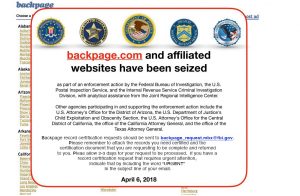Il NOrthern district della California con sentenza 19 luglio 2022, Case 3:21-cv-08062-CRB , Rangel v. Dorsey e altri, conferma la lunga fila di precedenti sulla invocabilità del safe harbour da parte della content moderation operata da Twitter (T.).
Il tweet censurato pare dicesse <HANG THEM ALL>
Sussistono tutti i tre requisiti
<< The three elements of Section 230(c)(1) are easily met.
First, despite Rangel’s insistence to the contrary, e.g., Opp at 8, Twitter clearly is a “provider . . . of an interactive computer service” under the CDA. See 47 U.S.C. § 230(f)(2); Dyroff v. Ultimate Software Grp., Inc., 934 F.3d 1093, 1097 (9th Cir. 2019) (the “prototypical” example is an “online messaging board”); Brittain v. Twitter, Inc., 2019 WL 2423375, at *2 (N.D. Cal. June 10, 2019) (Twitter is an interactive computer service).
Second, Rangel seeks to hold Twitter liable for decisions regarding “information provided by another information content provider”—that is, information that he, rather than Twitter, provided. Rangel mistakenly believes that he himself cannot be a third-party information provider under this provision, but this view has been repeatedly rejected. See, e.g., Ebeid v. Facebook, Inc., 2019 WL 2059662, at *4 (N.D. Cal. May 9, 2019).
Third, Rangel seeks to “treat [Twitter] as the publisher” because his claims derive entirely from Twitter’s decision to exclude his content and suspend his account—that is, traditional publishing functions. See Fair Hous.
Council v. Roommates.com, LLC, 521 F.3d 1157, 1170-71 (9th Cir. 2008) (en banc)
(“[A]ny activity that can be boiled down to deciding whether to exclude material that third parties seek to post online is perforce immune under section 230.”); Barnes, 570 F.3d at 1103 (“[R]emoving content is something publishers do.”). And Rangel’s contract claim fares no differently because it is based on the Terms of Service, which is discretionary and merely “incorporate[s] . . . [Twitter’s] right to act as a publisher.” King v. Facebook, Inc., 2021 WL 5279823, at *13 (N.D. Cal. Nov. 12, 2021); see Terms of Service § 4.
Accordingly, Twitter is immune from all of Rangel’s claims. >>
Il punto più interessante è il terzo: anche il titolare dell’account è terzo rispetto al publisher, per cui il requisito di legge è rispettato. Passaggio esatto , anche se scontat.
Anche non concedendo il safe harbour, la domanda sarebbe comunque da rigettare nel merito, prosegue la corte.
<< Even if Twitter were not immune, Rangel’s claims would still fail. Three claims
lack a private right of action or legal theory, and the other two fail as a matter of law.
First, the contract claim fails because Rangel does not plausibly allege two
necessary elements: (1) that Twitter breached a promise, or (2) that the breach caused him
damage. See Richman v. Hartley, 224 Cal. App. 4th 1182, 1186 (2014). Under the Terms
of Service, Twitter “may suspend or terminate your account . . . at any time for any or no
reason, including, but not limited to, if we reasonably believe[] you have violated these
Terms or the Twitter Rules and Policies.” Terms of Service § 4. Twitter violated no
promise in suspending Rangel’s account because it is more than “reasonabl[e]” for Twitter
to “believe[]” that a tweet that said “HANG THEM ALL” is “content that wishes, hopes,
or expresses a desire for death . . . against . . . [a] group of people.” See Spector Decl. Ex
B (dkt. 44-3) (Abusive behavior policy). Rangel’s contract claim also fails for the
independent reason that he does not allege damages: though Rangel demands $100 million
in compensatory damages, he nowhere alleges actual harm because of Twitter’s actions.
See Richman, 224 Cal. App. 4th at 1186.2
Second, the claim that Twitter unlawfully interfered with interstate commerce “by denying [Rangel] online Twitter access to shareholder paid-for national advertising” lacks
any identifiable or cognizable legal theory. SAC at 3; see Godecke, 937 F.3d at 1208.
Third, the wire fraud claim fails both because Rangel lacks a private right of action
and he does not allege fraud with particularity. See 18 U.S.C. § 1343; Fed. R. Civ. P. 9(b).
Rangel seems to think that any breach of contract that occurs online is actionable wire
fraud, see SAC at 3, but he has not adequately alleged breach, and that is not the law.
Fourth, the “shareholder fraud/public fraud” claim fails. To the extent that he
alleges shareholder fraud, Rangel has not alleged that he purchased any Twitter stock, so
he lacks standing. Blue Chip Stamps v. Manor Drug Stores, 421 U.S. 723, 731–32 (1975).
As for other fraud, Rangel alleges vaguely that Twitter “misrepresent[ed] . . . to their
shareholders, advertisers, the public and users as to Twitter’s fiduciary responsibility
regarding shareholders’ return on investment and share tradeability.” SAC at 4. This
vague allegation falls far short of the basic requirements of Rule 8, much less the
particularity required by Rule 9(b).
Finally, Rangel’s claim under California’s UETA fails because this law, which
requires that electronic signatures be given legal effect, see Cal. Civ. Code § 1633.7(a), has
no discernible relevance to his allegations. In any event, it confers no private right of
action. See Burgess v. Forbes, 2009 WL 1068877, at *3 (N.D. Cal. Apr. 20, 2009)>>
Il punto interessante è la ragionevoe credenza di T. che vi sia una qualche violazione delle proprie TOS.
Qui il giudice pare aver errato nell’iter motivatorio: infatti la clausola rinvia ad altra clausola (la previsione non è autosuifficiente) , che però il giudice non menziona. Quindi ravvisare la ragionevolezza della sospensione non persuade. Anche se alla fine probabilmente qualche regola violata si troverebbe , dato il grado di notevole offensività dell’espressione censurata.
(notizia e link alla sentenza dal blog del prof. Eric Goldman)
